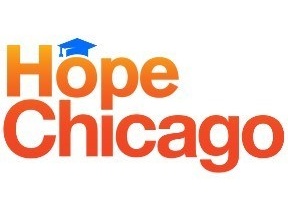
Hope Chicago, the two-generation scholarship program providing debt-free college and vocational support to students and their parents at five Chicago Public Schools high schools, today released an impact report demonstrating the projected economic and social benefits of its innovative model. The study, “Hope Chicago: Social Return on Investment,” authored by City University of New York Professor Clive Belfield and Economist at the Center for Benefit-Cost Studies in Education at the University of Pennsylvania, uses publicly available data on higher education outcomes, the relationship between educational attainment and social and labor force outcomes, and peer-reviewed research on similar college success interventions, along with early results from Hope Chicago’s first cohort, to project the social and economic impact of the new organization’s robust approach to postsecondary access and support. Key takeaways from the report include:
• Removing financial barriers is an investment in students: Prior to Hope Chicago, college enrollment rates at the five Hope Chicago partner high schools averaged 57%. In Hope Chicago’s first year that number rose to 74%, with 670 Hope Scholars enrolling in post-secondary education or training. Nearly one-third (28%) of these students are attending a college ranked as “highly competitive.”
• The Hope Chicago model reduces the racial borrowing gap and builds generational wealth for Scholars: African American and Hispanic students would be expected to borrow $31,490 for the same college education provided debt-free by Hope Chicago, significantly above the amount white students typically borrow for the same education ($20,330). Being debt-free would close approximately one-third of the earnings gap between Hope Scholars and their white peers. It also promotes more equity in home ownership, entrepreneurship, and continued access to higher education.
To view the full Hope Chicago: Social Return on Investment report, visit https://www.hopechicago.org/











